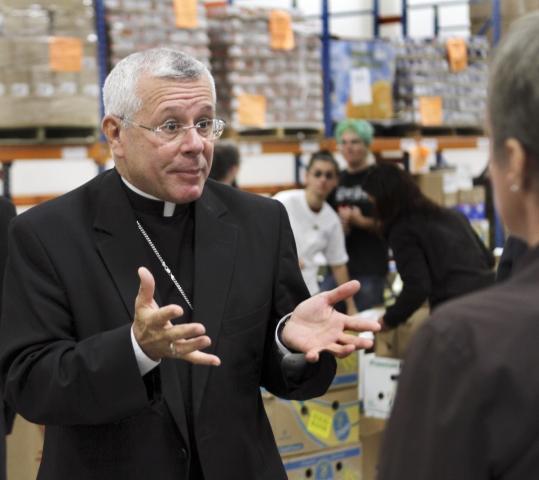By Brian Macquarrie
Boston Globe
September 20, 2011
http://www.boston.com/news/local/new_hampshire/articles/2011/09/20/vatican_appoints_ny_bishop_to_head_nh_diocese/
 |
| Bishop-designate Peter Anthony Libasci talked with Mel Gosselin of the New Hampshire Food Bank during a tour of the facility yesterday in Manchester. (Jim Cole/Associated Press) |
An auxiliary bishop from New York's Long Island was introduced yesterday as the Vatican's choice to lead New Hampshire's 285,000 Roman Catholics, who have been buffeted for the last decade by fallout from the church's sexual abuse crisis.
Rev. Peter A. Libasci, 59, will be installed as the 10th bishop of Manchester on Dec. 8 and succeed retiring Bishop John B. McCormack, 76, whose statewide diocese became a target of New Hampshire authorities determined to make church officials more attentive to allegations of abuse.
"The most important thing right off the bat is the compassion, and the desire to heal," Libasci said in Manchester. "To help restore and heal and rebuild individual lives, family lives, life of the church, life of the community."
On his first day as bishop-designate, Libasci visited Trinity High School, the New Hampshire Food Bank, a convent, and Cathedral Chapel in Manchester, where he joined other priests in afternoon prayer.
Boston Cardinal Sean P. O'Malley welcomed Libasci to New England. "We pray that his ministry will continue to be fruitful," O'Malley said in a prepared statement.
Libasci, who has been a pastor in Montauk, N.Y., since 1999, might confront some emotional remnants of the scandal that first erupted in the Boston Archdiocese. McCormack, who has been bishop of Manchester since 1998, served as director of ministerial personnel for Cardinal Bernard Law of Boston at a time when priests accused of sexual abuse often were handled indulgently or quietly transferred from parish to parish.
A reform group, New Hampshire Catholics for Moral Leadership, called for McCormack's resignation in 2003. "Stepping down would be stepping away," McCormack said at the time.
The previous year, the Manchester Diocese avoided the possibility of criminal charges in an agreement with the state in which church officials admitted that children had been harmed by shifting abusive priests to different parishes. The diocese also agreed to be audited by the state attorney general's office and to adopt strict child-protection procedures.
Libasci is mindful of the long-term consequences of the crisis, said Kevin Donovan, a diocesan spokesman.
"I don't think the abuse crisis is a period that the church will get past for a long time. That is going to be a pain that will stay with the victims and with the church as a whole for years to come," Donovan said. "His primary concern is for the feelings, healing, and support of victims."
Libasci, who has served as auxiliary bishop for the Diocese of Rockville Centre, N.Y., since 2007 and as a priest on Long Island since 1978, has seen the scandal's reach. In 2003, a grand jury in Suffolk County, N.Y., a part of the diocese, assailed the church's handling of sexual abuse allegations.
Libasci faces skeptics among some advocates for abuse victims, who argue that his decade of service on Long Island under Bishop William F. Murphy, a former top aide to Law, placed him close to a church culture that obscured the crisis for years.
One victim said he awaits Libasci's stewardship with cautious optimism. Luke Rheaume, who said he was abused in 1973 at age 15 in Littleton, N.H., approached the diocese with his allegation in 2002, he said. Although the report received prompt attention, Rheaume said, church officials did not treat him sympathetically.
Contact: macquarrie@globe.com
Any original material on these pages is copyright © BishopAccountability.org 2004. Reproduce freely with attribution.